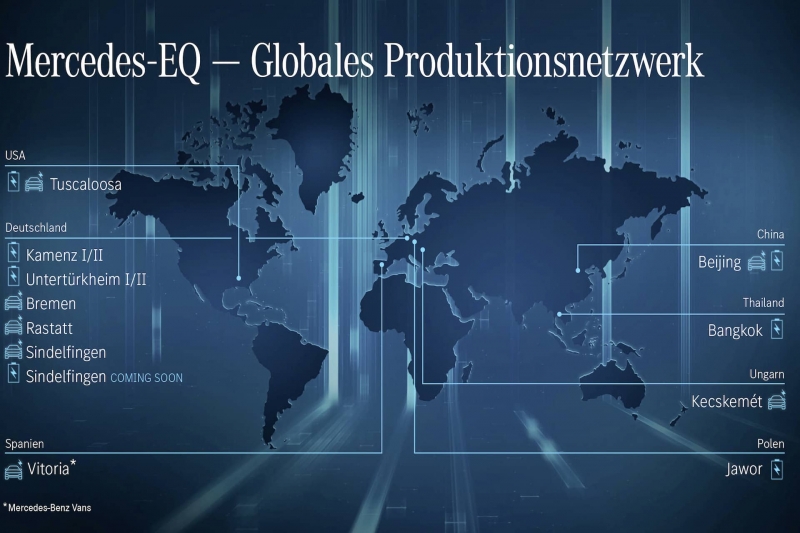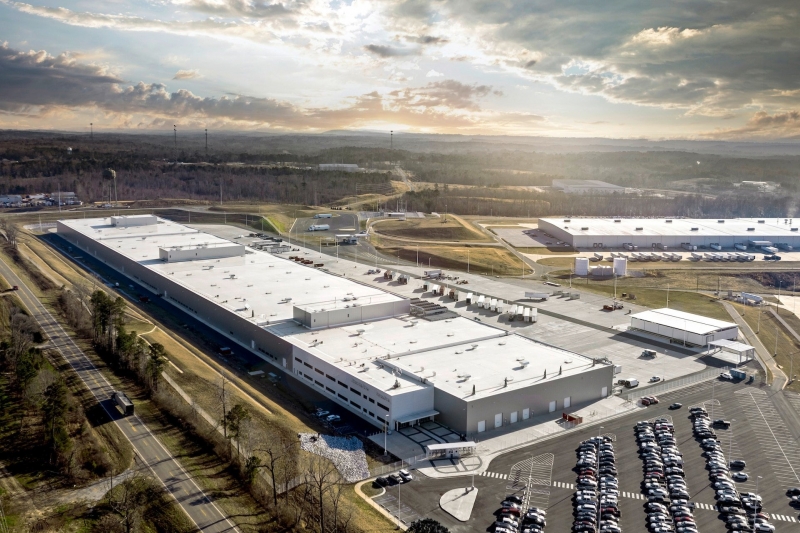Despite e-fuels: Mercedes CEO no longer wants to stick with combustion engines
Mercedes-Benz has been gearing its product portfolio towards electric cars in the luxury segment for some time. The future models will be divided into three product categories: Top End Luxury, Core Luxury and Entry Luxury. In an interview with the FAZ, Mercedes CEO Ola Källenius talks about complete electrification by the end of the decade and the strategy of no longer wanting to hold on to the combustion engine despite e-fuels.
The Mercedes-Benz plants in Sindelfingen, Bremen, Rastatt and Kecskemét will start production of the new models in the top-end luxury, core luxury and entry luxury segments from the middle of the decade. The Sindelfingen plant will be the lead plant in the top-end luxury segment and will produce models on the electric AMG.EA platform from 2025. The Mercedes-Benz plants in Bremen and Kecskemét are to produce models of the electric MB.EA platform in Europe in the future. The Rastatt and Kecskemét plants will be familiar with the repositioned models of the MMA platform from 2024. As part of the implementation of the “Mercedes-Benz Business Plan 2022 – 2026”, the company is investing more than two billion euros in its European production sites.
The batteries for the Mercedes-EQ electric cars are supplied by a global battery production network with factories on three continents. “Local battery production is a key success factor for Mercedes-Benz’s electric offensive,” explains the company. According to the carmaker, it has also been producing CO2-neutrally in all of its own plants worldwide since 2022 and has been purchasing electricity in Germany since this year that comes exclusively from renewable sources.

Mercedes is preparing its production network for a 100% electric car portfolio | Image: Mercedes-Benz
So sustainability has also become a growth business here – and combustion engines don’t really fit in there. In an interview with the Frankfurter Allgemeine Zeitung (FAZ), Mercedes CEO Ola Källenius made it clear that despite the new e-fuels regulation, Mercedes-Benz no longer wants to stick with the combustion engine from 2035. He is of the opinion that the electric drive is technically superior anyway. This also applies to luxury cars, which the company’s strategy is aimed at. “Modern luxury must be sustainable. Both go well together. The durable, the high-quality, the technically innovative is sustainable. What we are developing for our luxury models in terms of technology for ecological sustainability will also be used in other cars at some point in the future. And don’t forget: our cars last longer. This is also a contribution to sustainability,” argues Källenius.
How Mercedes wants to reduce CO2 emissions
Compared to 2020, Mercedes-Benz is pursuing the goal of halving CO2 emissions per car over the entire life cycle by the end of this decade. The most important levers for this are the electrification of the vehicle fleet, charging with green electricity, the improvement of battery technology and the extensive use of recycling materials including batteries and renewable energies in production. A green electricity supply contract secures the purchase of electricity from renewable energies at all times. By the end of next year, solar systems with an output of more than 11 MWp (megawatt peak) are to go into operation and by 2025 Mercedes-Benz intends to invest a three-digit million amount in the installation of photovoltaic systems. In addition, investments in wind turbines worth one billion euros are planned.
By 2030, it is planned to cover more than 70 percent of the energy requirements in production with renewable energies. 15 percent is to be generated by regenerative energies at the company’s own locations. This is to be achieved through the expansion of solar and wind energy and through the conclusion of further corresponding power purchase agreements. Mercedes-Benz is also pursuing the goal of reducing water consumption by 35 percent by 2030. In the next step, the group also wants to make its logistics CO2-neutral. The rail transport of vehicles and also components such as batteries plays an important role.
Mercedes sold just over 19,000 units of the luxury EQS electric vehicle in 2022 – according to Källenius, “good” sales figures | Image: Mercedes-Benz
The offer in the entry-level segment is getting smaller, but the CEO promises to continue offering cars in this area – preferably without sacrificing sales. There is a simple reason why brands like Mercedes are plunging into high-priced segments: they are more profitable than small cars, for example. “That gives us the financial strength we need to put technical innovations on the road. And we need that for climate protection in traffic,” says the 53-year-old. Mercedes is pursuing a strategy that is clearly based on the electric drive – and “we will not fundamentally change this because of the decisions on e-fuels”. Incidentally, you hear these words more and more often from car manufacturers – such as recently from Lamborghini CEO Stephan Winkelmann. The goal, according to Källenius, is to become CO2-neutral on the balance sheet across the entire value chain by 2039. And that’s where e-fuels don’t really fit into the concept, says the manager. E-fuels would certainly play a role for existing vehicles, but in the longer term he sees no future for synthetic fuels in the passenger car segment.
Until the beginning of the next decade, Mercedes would like to rely on both types of drive: the classic combustion engine and the electric drive – after that they will concentrate on the latter. Källenius has not yet commented on whether there will still be an offer for the upcoming “e-fuels-only” vehicle category from 2035. The efficiency of electric motors is too good. “Of the electricity that you generate with a wind turbine, for example, around 70 percent of the energy in an electric car arrives on the road as a driving force, with a combustion engine it is significantly less. In addition, e-cars do not emit any emissions, while that does not apply to cars that run on e-fuels,” says Källenius. This is relevant with regard to possible driving bans in cities. Although the combustion engine still has to be made fit for the new Euro 7 emission standard, Mercedes’ investments in classic engines will then be reduced by around 80 percent by 2026. With the major shareholder Geely, work is still being done in China on new combustion engines, the CEO admits. But this would be the last generation and exclusively for Hybride provided.

One of the newest Mercedes battery plants is in Bibb County, Alabama (USA): This is where lithium-ion batteries for the EQS SUV and EQE SUV are produced | Image: Mercedes-Benz
Källenius is also promoting the electric drive because it still has a lot of potential. He thinks: “Electric drives will overtake combustion engines in terms of performance before the end of this decade.” In the luxury segment in particular, the switch to electric drives would be faster than in the market as a whole. Källenius thinks it’s a good thing that the federal government has relaxed the climate protection law with regard to e-fuels. “They create more flexibility to use the capital for climate protection where it will reduce CO2 emissions most quickly and efficiently. It may well be that we in Germany can reduce emissions faster with more flexibility,” he says. Mercedes would continue to pursue the ambitious climate protection goals anyway.
“Lithium is the new petroleum”
Either way, the switch to electric cars is faster than many might expect – of course depending on the charging infrastructure and green electricity, he says. In any case, Mercedes says it wants to sell only electric cars in all markets where this is possible from 2030 onwards. However, the Mercedes boss cannot say anything about whether this will be the case throughout Europe. In an interview with the FAZ, Källenius is “cautiously optimistic” even for Germany, a pioneer in e-mobility. But “the momentum has increased tremendously,” he adds.
In order for the electric car to be successful, the charging infrastructure must be expanded and “everything must be done” to promote the generation of green electricity. In addition, a European, but also a German raw materials strategy is needed. “Lithium, which we need in huge quantities for batteries, is the new petroleum. Building lithium mining and processing capacity is a gigantic industrial undertaking. These raw materials will not all be mined in Europe. For that we need trade agreements with Canada, South America and Australia,” says Källenius. That would require government support. Not only politicians have to prove themselves, but also the car manufacturers themselves.
Mainly because the capital market is wondering whether Mercedes can manage the transformation to electromobility without affecting profitability and financial strength. Källenius says: “We need (…) staying power and have to implement our strategy step by step. We are in the decade of transformation.” Mercedes would always have done well when good cars were built. Above all, the Stuttgart-based car manufacturer’s products must be where they are expected to be in the market: “at the upper end of the relevant segments”.
Sources: FAZ – “The switch to electric cars is coming faster than expected” / Mercedes-Benz – press release from June 29th, 2022
